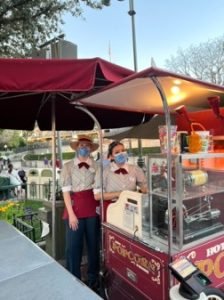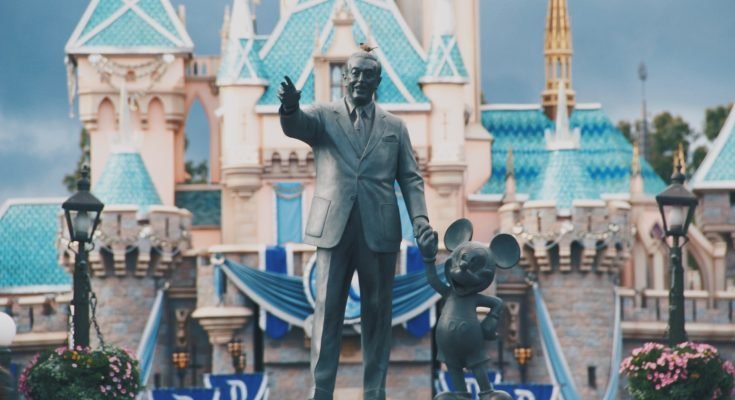Disneyland, the happiest place on earth, where children run around and meet their inspiring favorite characters; Parents get an adrenaline rush from riding rollercoasters and stuffing themselves with junk food galore; Teenagers get to feel like children for a few hours more.
But is Disneyland actually this happy?
One of the major contributors to Disneyland’s festivities is its employees. They oversee everything from getting guests on the rides, selling food at various stands and restaurants, keeping the parks clean, and directing the parades. But have you ever thought about how corporate treats them?
According to a message sent by Abby Ninow, former Disneyland employee in costuming, “For part-timers, the benefits were self-admission into Disneyland, a pass that allowed you to get up to three guests in with you sixteen times a year, discounts at Disney affiliated stores and parks, and discounts at certain stores and restaurants.”
The benefits seem great for those who admire Disneyland, and want to go on their days off. However, there are disadvantages as well.

Photo by Jenna Kallal | Two Disneyland Employees Working a Popcorn Cart
Cast members work long hours and have inconsistent schedules. Plus, a hectic work environment means they are unseen by managers.
When Ninow was asked if there were any rules or regulations she found unnecessary or unfair, she responded,
“The biggest issue for me though was the pay. Disney requires you to be fully available during any “on season”, including summer, holidays (especially Halloween through Christmas), and spring break time. They claim to work around college schedules but will often schedule you against it if needed and expect you to adjust. Despite being part-time I would find myself often working 40 hours a week but not getting full-time benefits. And most of the time I was working there I was making $12-$13 an hour which was around 2017-2018. For that much expectation on top of the work, which is very physical, I felt the pay was not enough.”
Another former employee, Donald Morales who held many jobs at Disneyland including Technology Services Manager, Vacation Planner, Hotel Reservations Agent, and Guest Services Agent, also had feedback on the topic.
In a message, he mentioned that Disneyland had a point system in place for when you were sick or late. If you got a certain number of points, you were fired. He also explained that they solicited college students claiming that they would work around their class schedules but most often did not.
What is the main source of these internal issues including scheduling? It is possibly managerial practices.
Ninow mentioned that she had 5 managers that worked in her department, and they each had different management styles. Check-ins were also rare and almost only by request.
Is this large corporation lacking managerial training? Are they placing too many employees under each manager?
“With how fast people get hired/fired (or quit), it very much felt like I was just a number. I could easily be replaced if I left. Not much care was given to my career growth, and it often felt like if you were succeeding, they would be less likely to let you grow to not lose a great worker,” Ninow added.
If you look back in time, there have been complaints by Disneyland employees regarding their wages, work environments, and treatment before.
A major turning point in the history of Disneyland employment took place back in 1984. A group of 18,000 unionized Disneyland employees held a strike outside of the park for twenty-two days.
According to the OC Weekly, “The company wanted a two-year wage freeze, no health-insurance benefits for part-time workers and the freedom to outsource jobs. Members of a five-union coalition representing the theme park’s custodians, ticket sellers, ride operators, salesclerks, and warehouse workers soundly rejected Disneyland’s final contract offer.”
Again in 2019, Disneyland faced a lawsuit for underpaying their employees.
Noah Biesida at The Voice of OC, a nonprofit news agency, said, “The workers’ lawsuit ran nearly two years since it was filed in late 2019, alleging that Disneyland had failed to follow a new minimum wage law approved by the voters in 2018 that required any businesses receiving a city subsidy to pay workers $17 an hour, with annual $1 increases.”
Disneyland is the happiest place on Earth for a reason, and it brings out joy and fulfillment. Yet the park needs to make changes concerning the unfair treatment of employees.
Employees’ wages should be increased; managers either need to be assigned fewer employees or need to be trained for extensive work; and Disneyland needs to treat their employees as people rather than numbers.
The happiest place on earth would not be so happy without the staff that keeps them running.

 The Liturgical Calendar: Should Christians Observe It?
The Liturgical Calendar: Should Christians Observe It? Embracing Authenticity in the Pursuit of Success: A Reflection on Journalism, Education, and Meaningful Academia
Embracing Authenticity in the Pursuit of Success: A Reflection on Journalism, Education, and Meaningful Academia Spring Concert: Music From Around the World
Spring Concert: Music From Around the World Recycling on College Campuses
Recycling on College Campuses
Leave a Reply